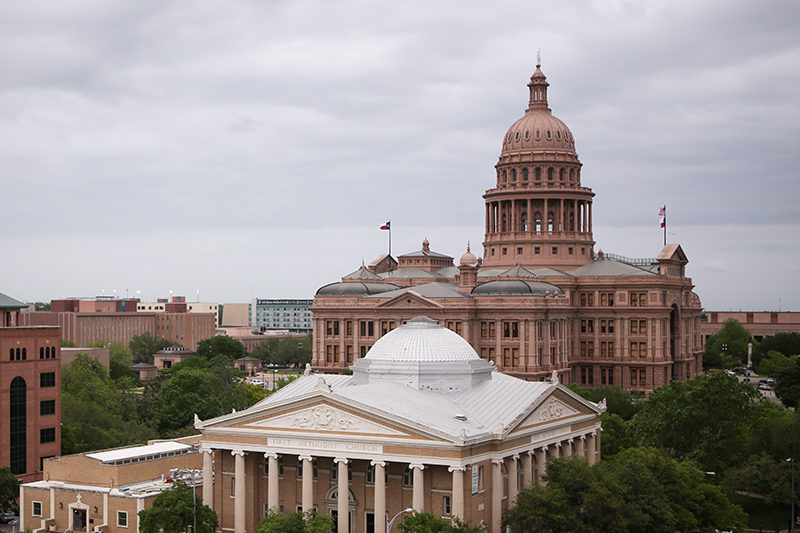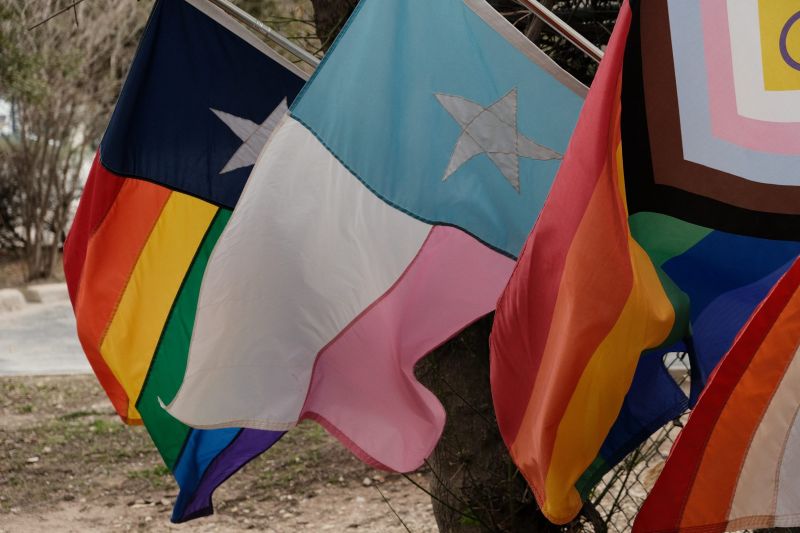LGBTQ+ Parents: “Don’t Say Gay” Bills Threaten Families
By Laura Miguel
Reporting Texas

The State Capitol of Texas. Cristina Pop/Reporting Texas File Photo
In 2022, Florida’s Republican governor Ron DeSantis signed the “Parental Rights in Education Act,” which prohibits instruction on sexual orientation or gender identity in kindergarten through third grade in public schools. In April 2023, the measure was expanded to all grades. Critics say the so-called “Don’t Say Gay” law marginalizes LGBTQ+ people.
Similar bills have cropped up in several states and are pitting LGBTQ+ advocates against conservative politicians who want to limit any discussion of LGBTQ+ issues in schools. Texas legislators are considering similar measures.
One of those measures, House Bill 1155, by Jared Patterson, R-Frisco, would ban teaching about sexual orientation and gender identity from kindergarten through eighth grade.
Patterson did not respond to interview requests, but in a press release in January, he stated that “The message (of the bill) is no more radical ideology in the classroom.”
Mary Elizabeth Castle, director of government relations at Texas Values, a right-leaning advocacy organization, told Reporting Texas that the measures will allow parents to discuss sexuality with their children “without the interference of other adults in schools indulging their ideas on sexuality or political ideologies.”

Pride flags hang outside The Little Gay Shop in Austin, Texas, on Feb. 23, 2023. In recent years, the number of anti-LGBTQ+ bills filed in the Texas legislature has skyrocketed, with over 30 bills this session, according to Equality Texas. Ry Olszewski/Reporting Texas file photo
LGBTQ+ parents disagree. In a series of interviews in March, LGBTQ+ parents told Reporting Texas that the measures would lead to a situation where their children do not feel safe and accepted at school.
Austin resident Candace Keri is a lesbian, a special education teacher and parent to a toddler, she plans to send to public school in Austin.
“If these were to pass, my presence in school could make my kid feel more unsafe because we are a two-mom family,” Keri said.
“It makes me feel unsafe as someone who manages special education cases and used to be a first grade teacher knowing that I might not be allowed to talk about myself or have photos of my family,” she added.
Schools often promote a heteronormative environment, and these measures discourage queer parents from participating in their kids’ education, Keri said.
“I think that these bills communicate to everyone that there is something bad or wrong about their families by telling people that they are not allowed to talk about something,” Keri added.
Austinite Alia Pederson is a parent to a kindergartner in the Austin Independent School District.
“We are a lesbian family so (that is) my child’s reality,” Pederson said. “It’s making her believe what she is seeing is not right or not true.”
“I do think these bills allow a certain amount of discrimination that is currently not present,” Pederson said. “I think allowing them to choose whom they love is not a political ideology in any way. If you’re not going to hide Cinderella or Snow White from your children, where there are kisses and men and women love each other, there is no reason to hide homosexuality,” she said.
“Just because you cover your child’s eyes from something you don’t like, doesn’t mean it doesn’t exist and your children will find out one way or another,” she added.
Sunshine Kreidner, is non-binary and a parent to a 2nd grader and a kindergarten in Austin.
Their 2nd grader has been exploring with different pronouns and has been able to do so safely in the school they are currently attending.
“In the case of gender- or queer-based bullying, I worried that the teacher would feel uncomfortable stepping in (if this bill passes),” Kreidner said. “They wouldn’t even be allowed to explain why it’s unkind, that they are still a person and should be treated kindly.”
Kreidner said she understands that some Christians support “Don’t Say Gay” laws, but warned not to paint the religion with too broad a brush. She has friends who are devout Christians and are caring and kind and not radicalized, she said.
“I feel like there are many scare tactics that people are just relying on to get the vote, Kreidner said. “(The laws are) causing significantly more radicalization than there would be otherwise.”
The bill was referred to the public education committee and is yet to be heard.